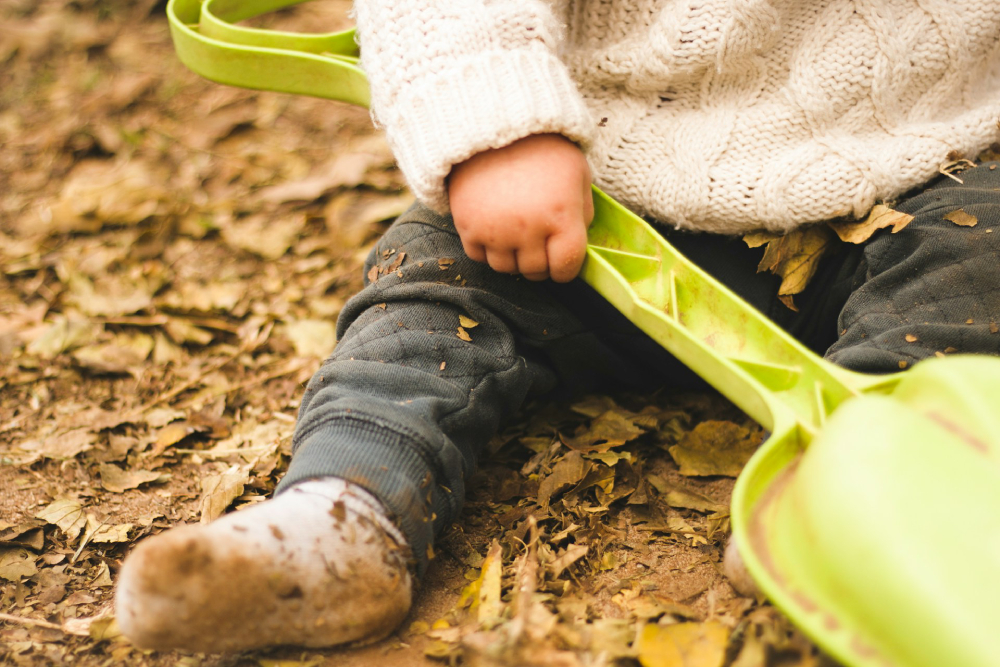
(Unsplash/Meghan Holmes)
My 4-year-old son had just vaulted himself onto the couch, where I sat holding his infant brother. "He's just a baby," my older son said, unprompted. "He doesn't know anything."
It was an astute observation: His baby brother was still in the eat-sleep-poop phase of life. He could barely sit straight, much less crawl, walk or talk. In that moment, however, I felt compelled to make sure my four-year-old knew that the little blob in my arms wasn't totally devoid of knowledge. The words that came out were, "he knows what 'safe' is."
It was my way of explaining to a young child the language of biochemical reactions he witnessed whenever my wife or I lifted up that baby and his crying would stop. It was my way of explaining my parenting "waltz," a three-step I do holding the baby when all the rocking and singing and shushing have failed. Something about that 1-2-3 rhythm, the up-down-back-and-around of it, reminded my babies that they were safe. It was a knowledge communicated through the twists and turns of legs and arms. Six months later, I wish they remembered.
That infant is now a year old and thinks it's hilarious to climb onto our kitchen chairs — or onto the table itself. The other day, with a gaping grin on his face, he tilted his head so far backward he just toppled over. From standing. It was a trust fall that my wife and I very much failed. (Fortunately, our living room rug is rather springy.)
I look at my children and echo my son's words from earlier: They're just babies. They don't know anything. But that's not what Jesus says when he encounters children throughout the Gospels.
Our 4-year-old is now 5. Despite my professional training in behavior management and positive reinforcement, I find myself reciting a "litany of don't" throughout the day: Don't fling snow in my face. Don't swing that stick near your brother. Don't punch me in the stomach.
For my sweet children, life has become a daily practice of knocking against the walls to see where the studs are. Like builders searching for where to drive the nail into a wall, they need to discover which parts of life will hold their weight and which parts will result in broken drywall and scraped knuckles.
As I watch them knock against the wall and floor and chair, the dutiful parent in me wants to keep reminding them what "safe" is. I look at my children and echo my son's words from earlier: They're just babies. They don't know anything. But that's not what Jesus says when he encounters children throughout the Gospels.
Instead, he says, "Everyone else, watch and learn." Jesus challenges his followers to become more like the little children he observes, and if I've learned anything from watching my two kids, it's this: That is a terrifying challenge.
When we talk about what it means to be childlike, we often use words like curious, wondrous, gentle and imaginative. These are good words, but they strike me as suspiciously adult. They sound like grown-ups trying to describe children the way critics describe art or sportscasters describe athletes. Such language might be accurate, but to the child they are irrelevant. Children are creatures of knuckles and knees.
Instead of curious and wondrous, what about clumsy and foolish? Instead of gentle and imaginative, what about brazen and blundering? Are these not the words that capture how we feel when we step into that other terrifying challenge that Christ issues: To take up our cross and carry it?
Advertisement
When I look back at my first attempts to write, I cringe at how clumsy my words were. When I think back to my first years of teaching, I flush with embarrassment at the foolish mistakes I made. When I reflect on my most painful disappointments throughout life, I notice many came from my most brazen ideas. When I have opportunities to interact with members of my community who don't speak the language I know, who might be experiencing homelessness or who grapple with addiction, all my eloquence vanishes. I blunder my way through conversations, desperately hoping I've communicated in a way that displays humanity and dignity rather than otherness or condescension.
These are my scraped knuckles. These are my skinned knees. These are the feelings I desperately try to avoid on a daily basis. They are the mistakes I've worked hard not to repeat. I've sharpened my writing, honed my teaching and endured awkward conversations. I've worked strategically to improve at these things like a dutiful adult — only to watch my clumsy, foolish, brazen, blundering children barrel toward new mistakes day after day.
I wish I remembered how to do that.
Children know what we adults often forget: The body often shows up before the mind knows what to do or the mouth knows what to say. The body is the thing with knuckles and knees, after all. It alone has the tools to test the walls and to climb them, however clumsily.
The children in my life — my kids, my neighbors and my students — remind me what all this testing and climbing promises: Not success or comfort, but stumbling and crying. It's scrapes on the knees of our confidence and knocks to our egos. It's more bruises, not fewer. It's failing to have the words to explain why I've shown up to any given service, classroom, relationship or essay, but trusting in the arms and legs that brought me there.







